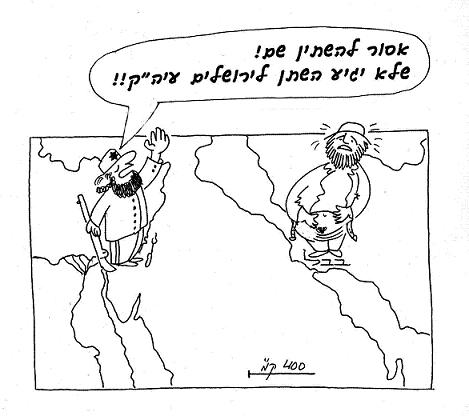
The sages warned against holding one’s urine for too long lest one’s belly swell and therefore they stated that one may urinate in public to keep from holding it in. There was an incident involving a man who held his urine and his belly swelled. Even great sages followed this ruling; Rav Samuel, in the middle of a speech to a large audience, had to urinate. He asked them to spread a sheet to separate him from the public and then he urinated. When he met his father, also a great sage, his father told him: I will pay you to go speak to the public and tell them that one may urinate in public, lest they think, since you asked for a sheet to be spread, that one is allowed to urinate only in private. There was also an incident with the sage Rav Ashi, who was walking on a bridge and had an urge to urinate, so he urinated on the bridge. They told him that his mother-in-law was on the way and would see him urinating. He replied: I would even urinate in her ear to keep from being endangered. The scholars asked: How do we know that the reason the belly swells is because one holds one’s urine? Perhaps the reason the belly swells is because he drank a leech. Answer: Since he held his urine for a long time he could no longer urinate properly, only being able to produce a trickle and not a stream. This shows that holding one’s urine causes one’s belly to swell. The scholars also supposed that holding one’s urine may cause male infertility because of the anatomy of male urinary tracts and semen ducts. A man has two openings in his sexual organ. From one issues urine and from the other semen; they are separated by the thickness of a garlic peel. A man who holds his urine is liable to tear this separation and cause sterility. The sage Reish Lakish explained the verse “You shall be blessed above all peoples; there shall not be a male or female barren among you or among your livestock” (Deuteronomy 7:14): When shall you not be barren? When you urinate as do the animals, in public without shame.
The sages also warned against people in Babylon urinating into a clay receptacle or on a downward slope of hardened ground lest the urine flow and reach the spring of Eitam in the vicinity of Jerusalem. Why would it be a problem if the urine reached the Eitam spring? The High Priest immerses himself in the Eitam spring before entering the Holy Temple on the Day of Atonement.
(Babylonian Talmud, Tractate Bechorot 44b)
